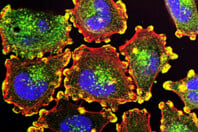Κάτι που δεν έχει σχολιαστεί είναι σχετικά με τον καρκίνο του προστάτη, όπου το αντίστοιχο test είναι ακριβές μόνο σε ποσοστό 15% Prostate-specific antigen (PSA) blood testProstate-specific antigen (PSA) is a substance made by cells in the prostate gland (both normal cells and cancer cells). PSA is mostly found in semen, but a small amount is also found in the blood. Most healthy men have levels under 4 nanograms per milliliter (ng/mL) of blood. The chance of having prostate cancer goes up as the PSA level goes up.When prostate cancer develops, the PSA level usually goes above 4. Still, a level below 4 does not guarantee that a man doesn’t have cancer – about 15% of men with a PSA below 4 will have prostate cancer on a biopsy. Men with a PSA level between 4 and 10 have about a 1 in 4 chance of having prostate cancer. If the PSA is more than 10, the chance of having prostate cancer is over 50%.If your PSA level is high, your doctor may advise either waiting a while and repeating the test, or getting a prostate biopsy to find out if you have cancer. Not all doctors use the same PSA cutoff point when advising whether to do a biopsy. Some may advise it if the PSA is 4 or higher, while others might recommend it at 2.5 or higher. Other factors, such as your age, race, and family history, may also come into play. (http://www.cancer.org/cancer/prostatecancer/moreinformation/prostatecancerearlydetection/prostate-cancer-early-detection-tests)























